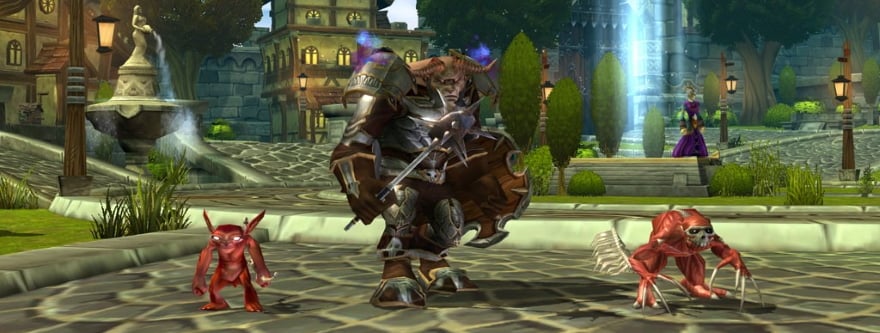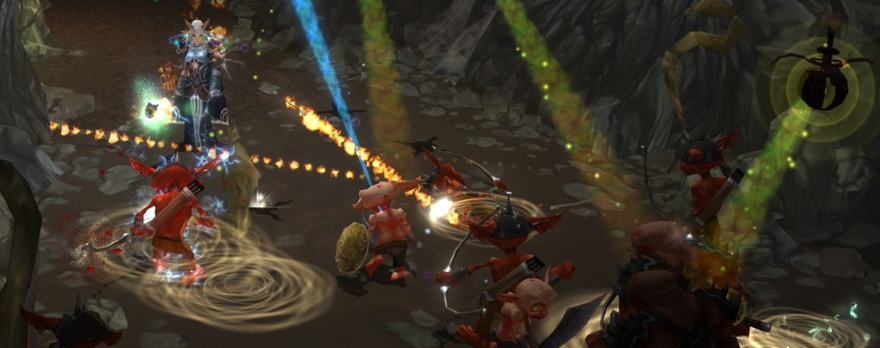
Whenever the topic of Flagship Studios comes up, usually it’s in conjunction with Hellgate: London. And while Hellgate certainly was a huge and ultimately not-too-successful effort by the studio, there was another MMO that was greatly affected by the company going belly-up in 2008 called Mythos.
I felt that Mythos absolutely should be discussed in its own column here, because this game really did have promise. It was a fantasy action-RPG that was being developed by some of the people behind the Diablo franchise, and the idea of taking that sort of gameplay to a massively multiplayer persistent world environment was downright intriguing.
So today, let’s rewind the clock before Mythos got “Flagshipped” and see what this title was and why it had many gamers — myself included — so excited.
Coming in from a Blizzard
So a brief recap about Flagship itself. Back in 1993, a team of developers founded a studio that eventually became Blizzard North, the subsidiary in charge of developing the Diablo games. Following a dispute with Blizzard, a large number of developers from Blizzard North up and left the company in 2003 to found Flagship Studios. The three big names at the top of the billet were Bill Roper, Max Schaefer, and Kenneth Williams.
While the main Flagship team worked on Hellgate: London, a sort-of spiritual successor to Diablo, one of its members, Travis Baldree, started working on a little “evening project” to test out some of the tech for the game. This project started to take shape as a much more light-hearted fantasy ARPG, and it wasn’t too long before Flagship saw potential in its future and gave the go-ahead to form a team to pursue its development.
Originally called “Project Tugboat,” Mythos fell under the care of Flagship Seattle, a subsidiary of the main company, in 2006. Gradually the team expanded, and before all was said and done, 14 developers were assigned to the game.
“The scope had changed from a simple test to plans for a free-to-play MMO with persistent areas, a cash shop for items, and a variety of features considered standards in the MMO space,” said former Mythos developer Jason Beck. He admitted that there was nothing about Mythos that was “groundbreaking” or innovative, but both the team and testers had a whole lot of fun messing around in its world.
Initially, Mythos was structured with a lot of disconnected instances that didn’t give much opportunity for players to mingle outside of hubs. However, after seeing that the community did want to be social on the landscape, Flagship Seattle added an overworld map that brought a lot of connection and cohesion to the title.
“We believe that there really isn’t much in the market like what we were attempting to do – an action-RPG with a large shared MMO world, and fast-paced randomized dungeon adventuring,” said Baldree in a 2008 interview.
A lot of fun for free
The game didn’t have the largest roster of races (Satyr, Human, Gremlin, and Cyclops) or classes (Bloodletter, Gadgeteer, and Pyromancer), but the team was more focused on getting these right and then adding more later rather than biting off more than they could chew.
The business model also started to get some attention, as Flagship was creating Mythos to be a free-to-play MMO — rather than the subscription games that were the standard at the time. It also helped that Mythos sported a cartoony style in the vein of World of Warcraft, which had proved to be a big asset to the 2004 MMORPG.
While the game was originally intended to be out by 2007, delays set in as further development was required. Mythos went into closed beta in 2007 and aimed to transition into an open beta a year later. However, that was not to come.
As I talked about in the Hellgate: London article, that title’s disappointing and troubled launch contributed to a massive backlash and an ultimate downfall for Flagship Studios. The studio dissolved in 2008 with only one title launched and Mythos on the verge of release… but not getting the chance. After that disappointing summer, the whole Flagship Studios team reformed as Runic Games and started developing a similar product known as Torchlight.
Mythos resurrected
After Flagship collapsed, the rights and ownership of Mythos went over to HanbitSoft, which vowed in 2009 to continue development and try to bring the game to market. “Mythos is currently in a good condition where it’s being reconstructed. We are trying to keep the strengths that Mythos used to have, and strengthen them even more to make [it] more suited as an online game,” the company said in that year.
However, this proved to be a longer-than-expected process, with HanbitSoft finally bringing the game to launch in spring 2011. Mythos actually got its first real release… for what would prove to be a short-lived run in Europe. Underwhelming reception led to the title closing later in the year.
But as with Hellgate’s many resurrections, HanbitSoft wasn’t about to let its possibly profitable property go to waste. It tried again in 2012, repackaging the game as Mythos Global and handing it to T3 Entertainment for the day-to-day operations. Mythic Global actually endured for nearly two years, but ultimately met its fate in January 2014 when the servers were turned off in Korea.
And there in the dustbin of history, Mythos has rested ever since. Seeing how popular the Torchlight series has been along with plenty of other MMOARPGs (Path of Exile, Marvel Heroes), it’s a real shame that Mythos, not Hellgate London, wasn’t the first title out of the door at Flagship. Who knows what might have happened?
 Believe it or not, MMOs did exist prior to World of Warcraft! Every two weeks, The Game Archaeologist looks back at classic online games and their history to learn a thing or two about where the industry came from… and where it might be heading.
Believe it or not, MMOs did exist prior to World of Warcraft! Every two weeks, The Game Archaeologist looks back at classic online games and their history to learn a thing or two about where the industry came from… and where it might be heading.

















